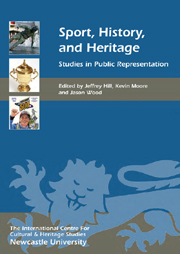Book contents
- Frontmatter
- Contents
- List of Illustrations
- Acknowledgments
- Sport, History and Heritage: An Investigation into the Public Representation of Sport – Editors' General Introduction
- HISTORY, HERITAGE AND SPORT
- MUSEUMS AND THE REPRESENTATION OF SPORT
- 7 Sport in Museums and Museums of Sport: An Overview
- 8 The Everton Collection: Unlocking the Value of a National Football Archive
- 9 Culture, Commerce, Capitalism and Commemoration: Dmitri Piterman and the Alavés Football Museum
- 10 Replacing the Divots: Guarding Britain's Golfing Heritage
- 11 Upping Our Game: The New Wimbledon Lawn Tennis Museum
- SURVIVALS AND LEGACIES: SPORT, HERITAGE AND IDENTITY
- Afterword: History and Heritage in Sport
- List of Contributors
- Index
- HERITAGE MATTERS
9 - Culture, Commerce, Capitalism and Commemoration: Dmitri Piterman and the Alavés Football Museum
from MUSEUMS AND THE REPRESENTATION OF SPORT
Published online by Cambridge University Press: 05 April 2013
- Frontmatter
- Contents
- List of Illustrations
- Acknowledgments
- Sport, History and Heritage: An Investigation into the Public Representation of Sport – Editors' General Introduction
- HISTORY, HERITAGE AND SPORT
- MUSEUMS AND THE REPRESENTATION OF SPORT
- 7 Sport in Museums and Museums of Sport: An Overview
- 8 The Everton Collection: Unlocking the Value of a National Football Archive
- 9 Culture, Commerce, Capitalism and Commemoration: Dmitri Piterman and the Alavés Football Museum
- 10 Replacing the Divots: Guarding Britain's Golfing Heritage
- 11 Upping Our Game: The New Wimbledon Lawn Tennis Museum
- SURVIVALS AND LEGACIES: SPORT, HERITAGE AND IDENTITY
- Afterword: History and Heritage in Sport
- List of Contributors
- Index
- HERITAGE MATTERS
Summary
This chapter is a case study of the tensions between international business, a powerful entrepreneurial drive and a dominating personality, and an Association football club which represents civic pride and provincial and regional identity, together with the aspirations to on-field success and glory of an extensive popular membership. It connects with debates about globalisation and identities, the commercialisation of sport and the exploitation of the club as brand and marketing tool and the multiple roles of sport in the economies and polities of advanced capitalist societies (Guilianotti and Robertson 2009). It has two central themes: the shifting and contested relationships between external capital on the one hand and local loyalty and sense of identity on the other, in the intensively commercial environment of professional football; and the relationships between clubs, management, fans and local and regional economic and political actors in the articulation and expression of cultures of pride, commemoration and celebration through representations of identity by way of history and heritage. The first has yet to attract sustained attention from academics, although some excellent investigative journalism has illuminated its hidden workings and disreputable corners (Conn 2005). The second intersects with an established area of debate on the applicability of the concept of topophilia, defined here as emotional attachment to places and their associations, to sporting arenas.
- Type
- Chapter
- Information
- Sport, History, and HeritageStudies in Public Representation, pp. 125 - 146Publisher: Boydell & BrewerPrint publication year: 2012



